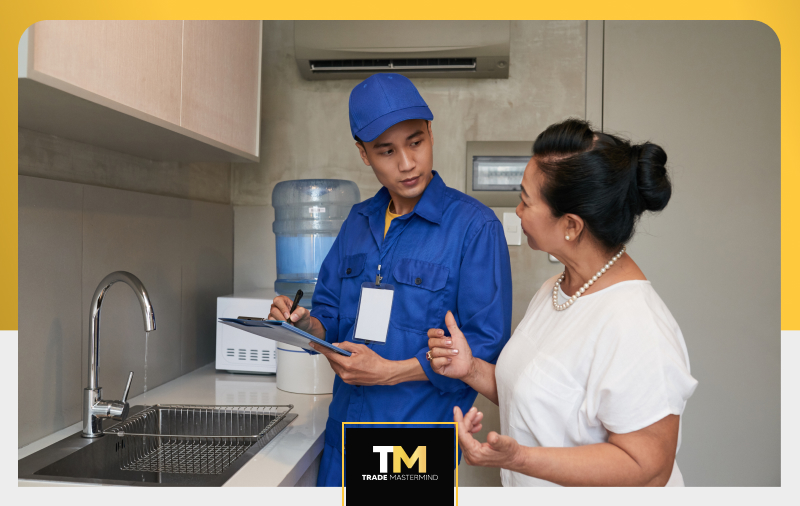Running a successful plumbing and heating business requires more than just excellent plumbers. Proper plumbing management tips are necessary to streamline operations and increase profitability. A plumbing business consultant can help analyse your systems and recommend improvements. Here are some key tips for plumbing business owners to consider.
[divi_library_layout id=”16468″]
8 Plumbing Business Management Tips to Streamline Your Business Process
1. Hire the Right People
One of the most important plumbing management tips is to hire reliable employees who are skilled in their jobs. Take the time to conduct thorough interviews of potential candidates to gauge their technical abilities, personality, and work ethic. Look for people who are professional, accountable, and able to work well independently when needed. Provide training to new hires to ensure they follow your company’s processes. Construct comprehensive job descriptions to outline roles and responsibilities. Develop an employee onboarding program to get new staff up to speed quickly. Treat employees well to promote retention in your plumbing business. Establish clear performance expectations and conduct regular performance reviews.
2. Implement Standard Operating Procedures
Create detailed standard operating procedures (SOPs) for all aspects of your plumbing and heating business such as estimating, ordering supplies, completing installations, conducting inspections, following up with customers, and more. Document specific steps staff should follow for routine tasks. Train employees on the SOPs and stored procedures in an easy-to-access centralised location. This helps promote consistency in work quality and the customer experience. It also ensures continuity when staff are absent. SOPs streamline operations by eliminating waste from employees “reinventing the wheel”. They promote accountability by defining “the right way” to get things done.
3. Optimise Scheduling and Dispatch
An important plumbing management tip is to have an optimised scheduling and dispatch system. Use a computerised system to schedule appointments and jobs on a weekly or daily basis based on staff availability. Input all jobs, requested service times, travel times between appointments, and scheduled breaks. Monitor lead times and due dates to ensure timely completions. Dispatch the closest available technician to each job to reduce drive times. Equip technicians with tablets or smartphones loaded with the daily schedule, maps, and access to key company systems. Optimise routes to minimise drive times between jobs. This efficiency allows fitting in more jobs each day.
4. Leverage Technology and Software
Invest in user-friendly business software and technology applications that are tailored for companies in the plumbing and utilities industries. These systems can help with management areas like estimating, invoicing, supply ordering, inventory control, scheduling, dispatch, field service management, CRM, accounting and more. Integrate systems together for single data entry and automatic data sharing between modules. Train staff on usage to leverage these tools fully. Look for cloud-based options for anywhere accessibility. Tech tools allow remote oversight of operations and key performance metrics. They streamline coordination between office and field staff. Proper utilisation of technology is an important plumbing management tip.
Also Read: How to Start a Plumbing Business in UK
5. Rely on Proper Accounting Practices
Financial oversight is important for any plumbing and heating business. Establish accounting best practices that you adhere to diligently. Use bookkeeping software for tracking income/expense transactions, payables, receivables, banking, tax compliance and reporting. Implement a detailed chart of accounts to categorise financial data. Rely on invoicing templates that clearly itemise services. Track labour hours for jobs to ensure accurate time tracking. Monitor cash flow regularly and optimise payment collection. Strict accounting and record-keeping is critical for financial health, determining pricing to ensure margins, and preparing for tax preparation. It provides visibility into areas needing improvement.
6. Control Inventory Effectively
Proper inventory control is another key plumbing management tip. Know what parts and supplies you keep regularly in stock versus specialty items ordered upon request. Track inventory levels, reorder points, par stock levels, and consumption patterns to maintain efficient stock levels. Use inventory management software integrated with purchasing. Implement first in, first out (FIFO) practices. Store items logically using bins, racks or shelves labelled clearly. Keep supplies secured, clean, and organised to find things quickly.
7. Focus on Customer Service
Outstanding customer service is imperative in the service industry. Train your team on proper communication, problem-solving, documentation practices and follow up procedures. Measure metrics like on-time arrival, resolving issues on first visit, follow up surveys, online reviews. Empower staff to make reasonable customer accommodations when possible. Go above and beyond at times when warranted. Use a CRM and call centre functionality for centralised contact with clients. Employ checklist templates to ensure consistent service delivery. Keep customers informed of project status through convenient updates. Address complaints promptly and find resolutions. Repeat customers and referrals come from tremendous customer care.
Related Article: 10 Plumbing Sales Tips to Boost Your Business
8. Analyse Key Performance Metrics
Periodic performance analysis helps any business make ongoing improvements. Track core plumbing management metrics like revenue, profit margins, job closing ratios, average invoice size, staff productivity, overtime, equipment/vehicle usage, customer retention and growth. Benchmark to goals and industry standards. Identify underperforming areas that warrant attention or celebration of successes. Conduct root cause analysis of any declines. Implement corrections and adjust goals/strategies accordingly. Communicate positive metrics back to employees for continued motivation. Ongoing analysis is important for a plumbing and heating business to optimise continuously.
Final Take
Implementation of these key plumbing management tips helps streamline business processes for plumbing and HVAC contractors. It creates accountability, reduces waste, improves productivity and enhances customer satisfaction. Make continual optimization part of company culture to evolve and compete strongly. For help building customised systems, contact the experienced business advisors at Trade Mastermind. They provide tailored coaching, training and consulting proven to take many plumbing and heating businesses to the next level.








